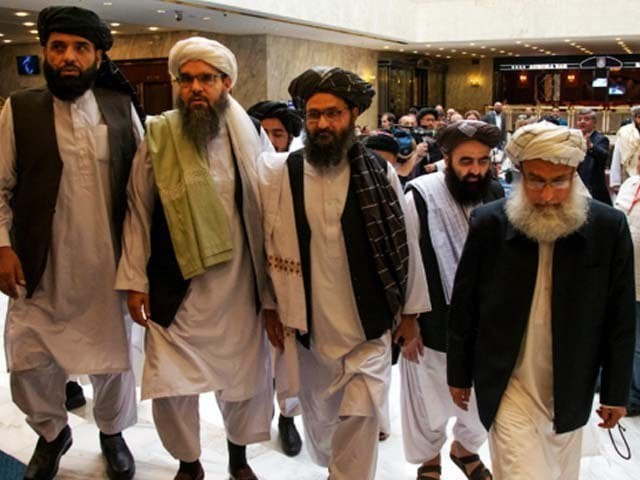Taliban’s no to direct talks with Kabul
For Pakistan’s role to be effective, Islamabad must comprehend ground realities, concerns of neighbouring countries

PHOTO: EXPRESS
Responding to the statement, the Taliban expressed their readiness on meeting the Pakistani Prime Minister. However, subsequently the group issued a statement reiterating their stance on direct contact with the regime in Kabul. The Taliban reaffirmed their stance and stated unequivocally that they would not enter into direct talks with the government in Kabul until a definitive US declaration for withdrawal of forces had been made public.
By now, Pakistan should have understood the dynamics of the conflict in Afghanistan. If the Taliban have refused to negotiate with the Afghan government in the past, they would not make a somersault now only because Washington is seeking greater Pakistani involvement in the pursuit of peace and reconciliation.
The Taliban will not agree to a ceasefire for very simple reasons. In any guerilla war that depends on the willing participation of highly committed volunteers — like the Taliban movement — a ceasefire can lead to the termination of the conflict at the expense of the core objectives of the movement. If there is no agreement following a ceasefire or if the agreement is not being enforced in letter and spirit, where does the movement end then? It is nearly impossible to call the volunteers and make them fight again because the talks have not delivered results.
From the point of view of the Taliban, a ceasefire can be a disaster. Not only that, the idea of a ceasefire will be very difficult to sell to the rank and file soldiers of the movement. Unless the field cadres of the Taliban see a noticeable and tangible reciprocal action — like the beginning of a time-bound withdrawal of foreign forces — they will not be willing to give up fighting. The movement can split into factions if there is a divergence of views on whether to stop fighting or carry on the struggle. Meanwhile, some Taliban leaders believe a ceasefire is a trap and they will not go along with a fundamentally deceptive plan that could derail the movement. Given this, a ceasefire is a question of survival for the Taliban movement — a fact that Pakistani policymakers are ignoring.
But there are signs that the US and the Taliban are closer to a consensus on some issues. If that happens and a memorandum of understanding is signed at the end of the current round of talks, there will be an intra-Afghan dialogue between the Taliban and other political and ethnic groups, including the government representatives. This can pave the way for eventual Taliban-Kabul talks.
However, it must be noted that a direct interaction between the group and the Kabul government will not necessarily yield any substantive outcome because the two sides are still poles apart.
The Kabul government will not easily compromise on its constitutional mandate to rule the country. It will continue to oppose any arrangement that will rob it of its authority which is sanctioned by an electoral process, howsoever questionable that claim may be. The solution lies in a broad-based interim government that is legalised by the Loya Jirga. The issues that will have to be confronted in creating such a government through the mechanism of the Loya Jirga, and which Islamabad must ponder over seriously are: the composition of such a government, the duration for which it will function, the mandate of such a transitional setup, and its leadership.
In order to take the Kabul regime on board, the US will have to put enormous pressure on Kabul if it is seeking a genuine and lasting settlement. The fact that the regime hardly controls 45% of the country’s territory, and that the spread in insurgency has resulted in an increase in violence and deaths of civilians and members of security forces, will have to be highlighted as a failure of the current system.
The objective realities have to be recognised as well. The fact that Russia, China and Iran have established formal relations with the Taliban must not only be acknowledged, but also incorporated in a vision for peace in Afghanistan. These three countries are deeply worried about the ingress of Daesh into their territories. They are now convinced that only a Taliban-inclusive government can eliminate the brutal outfit, and the US appreciates this concern of the regional countries.
For Pakistan’s role to be effective, Islamabad must comprehend the ground realities and the concerns of the neighbouring and regional countries. For that to happen, it must not be fixated on diminishing the role of its archrival, India. This obsession with India’s role in the region takes away substance from the Pakistani narrative. An impression is created erroneously that Pakistan’s primary objective is to exclude India from the conflict resolution scheme. This reflects as a desire to dictate terms — something that Afghans of all political affiliation reject vehemently, and has not earned any respect for Islamabad amongst them.
As the security situation deteriorates and as despondency takes hold, there is a compelling need for an honest assessment of the situation. This assessment must not only incorporate the objective realities of the situation but also lay down a roadmap for ending the conflict.
An overwhelming number of Afghans are desperately looking forward to an end to the long conflict. The fatigue syndrome is visible. This should motivate all stakeholders to redouble their endeavours to find a lasting settlement to this long war.
Published in The Express Tribune, August 1st, 2019.
Like Opinion & Editorial on Facebook, follow @ETOpEd on Twitter to receive all updates on all our daily pieces.















COMMENTS
Comments are moderated and generally will be posted if they are on-topic and not abusive.
For more information, please see our Comments FAQ